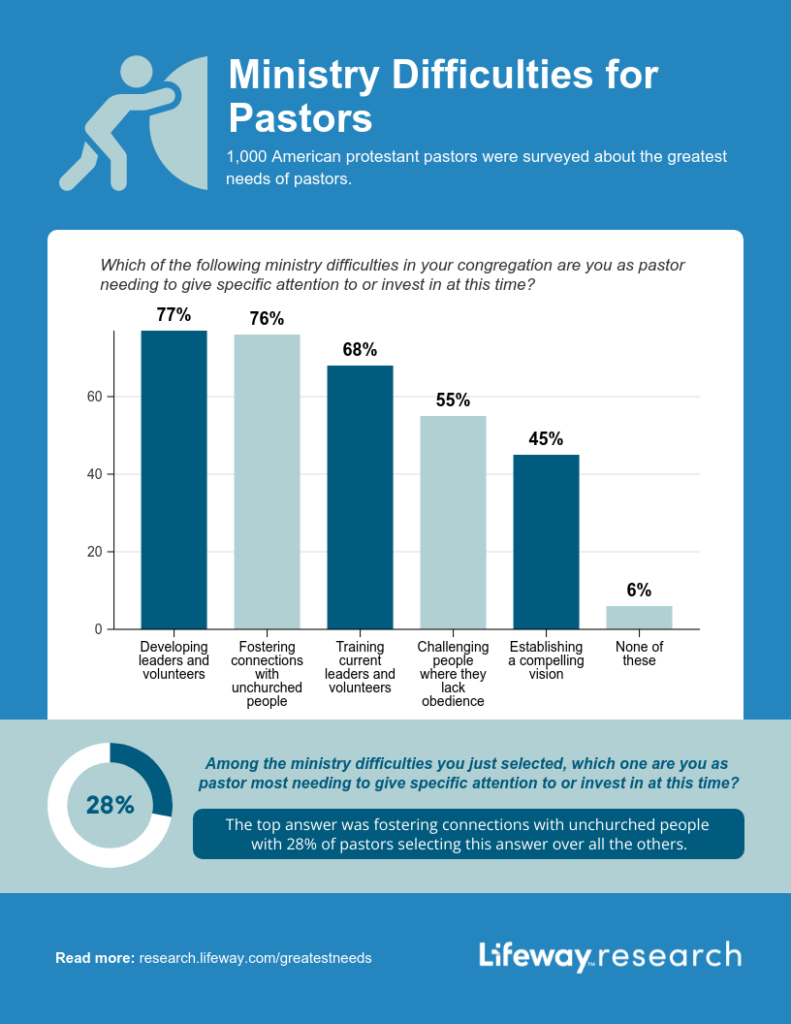By Dan Iten
According to a recent Lifeway Research survey, 76% of pastors said that fostering connections with unchurched people is an area of difficulty to which they need to give specific attention or invest more time. In the responses, 28% of pastors selected this answer over other available options. So, why is connecting with unchurched people difficult for pastors? What practical steps can they take to start building relationships?

It’s not hard to see why pastors find it difficult to meet and connect with the unchurched. Many pastors feel consumed by church life and the responsibilities of shepherding the flock entrusted to them. Weeks are spent writing sermons, overseeing church operations, and meeting with leaders, volunteers, and those in need of pastoral care.
As a former Executive Pastor, I remember times when my only regular interactions were with people from church, leaving little time for family let alone people outside the church community. However, this cannot and should not be our excuse to not share the good news of the gospel with a world that is desperate for it. Pastors must be an example of how to build relationships that lead to the gospel being shared and accepted.
Here are four practical steps to better engage with the unchurched world around us.
- Look next door, literally.
There is no need to search far and wide for unchurched people. They are most likely next door to you! Our neighbors are the easiest, obvious, and strategic people to connect with personally. However, that can seem daunting, especially today where you can go years without knowing your neighbors’ names, jobs, or anything about their lives. Engaging with them might feel awkward at first, especially if you’ve just casually waved at them for years.
You might feel some resistance to diving into your neighborhood because you fear it will be another place you need to “be on” outside of your church. Yet you don’t need to be the perfect pastor next door. Inviting your neighbors into your life is a great way for them to truly see you and meet Christ.
The Art of Neighboring by Jay Pathak and Dave Runyon is well worth a read. The authors remind us in their introduction, “The practice of neighboring creates incredible opportunities for us as believers to connect our story to the stories of our neighbors and to God’s story.”
- Pursue intentional routines.
Outside of our neighbors, we encounter unchurched people every day. Be intentional in your everyday routine to build relationships. That may mean choosing the same checkout line at the grocery store to get to know the cashier. Going to the same coffee shop to interact with the baristas and regular customers. Returning to the same person to cut your hair.
It’s easy to go about our business and never interact with anyone, like using self-checkout or ordering coffee on an app for pick up. But creating intentional routines helps to build relationships that make a stranger become an acquaintance and then a friend to whom you can earn the right share with them the good news.
- Establish group hobbies.
A 2016 poll showed that 20% of Americans don’t have hobbies. I think that for many pastors the church has become their hobby, which doesn’t really count! To build relationships with the unchurched, find hobbies you enjoy that also involve other people.
The place where I met many unchurched people was at the CrossFit gym. I know I might have lost you at “gym,” but group exercise has allowed me to meet others and get to know them day after day while sweating and working out together. It is a community where people hang out socially. Ultimately, I have been able to pastor others at the gym as they ask my advice on challenges in their lives and walk people to knowing Christ and seeing them place their faith in Him.
Carve out time to meet with groups of people, whether it’s at the gym, a coffee shop, the library, or anywhere else that you enjoy spending time.
- Change your schedule.
To intentionally engage with the unchurched, prioritize non-church things on your schedule. There are always more congregants to meet, more meetings to attend, or more conferences to participate in. But if you’re serious about reaching the unreached, you need to be out in the world and engaging with people outside your church walls. Learn to say “no” to some meetings to make space for your neighbors, hobbies, and non-church routines.

